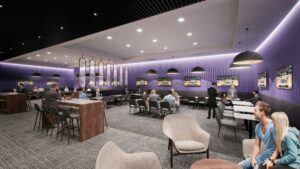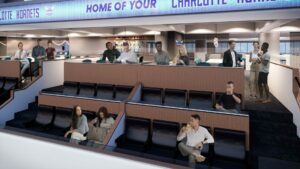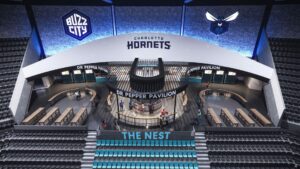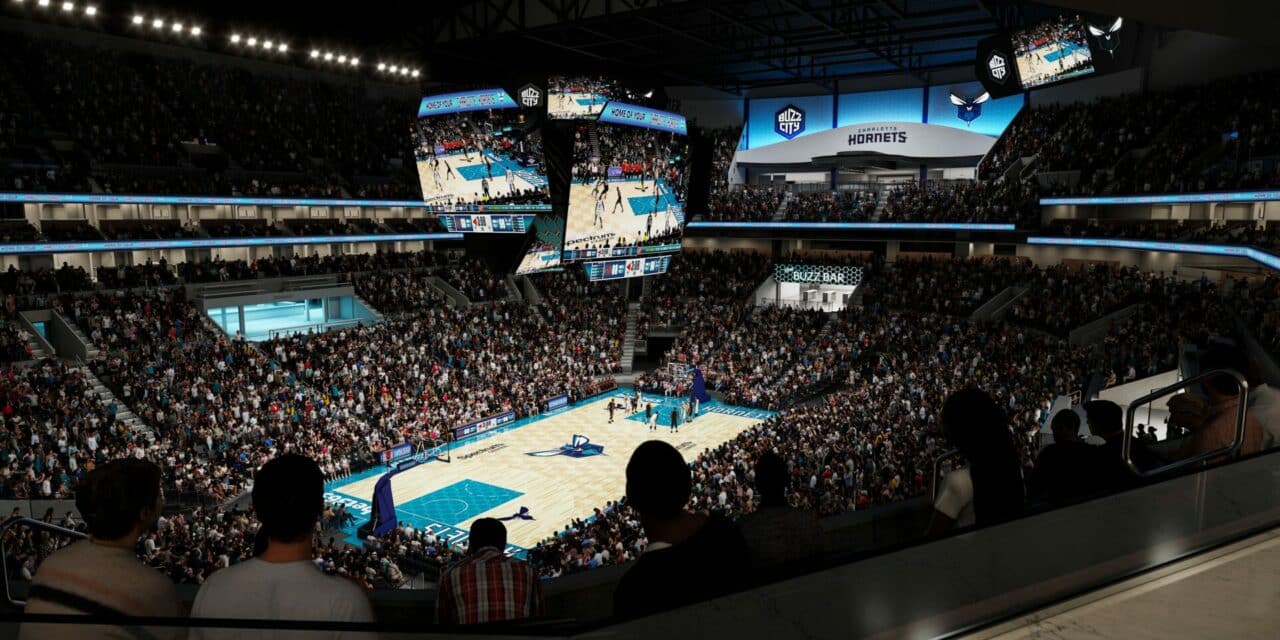HORNETS NEST: Spectrum Center, which turns 20 years old next year, will go through a comprehensive makeover the next two summers. The NBA Charlotte Hornets run the arena. (Renderings courtesy team)
Key piece expanding one of NBA’s smallest lower bowls
The Charlotte Hornets shared plans on Thursday for an extensive renovation of Spectrum Center, to include 2,500 additional seats in the lower bowl, a new courtside club and a greater variety of suite options.
Details on the project, which has been in the works over the past four years, were provided to local media by Donna Julian, Spectrum Center’s executive vice president and general manager, and Jacob Gallagher, chief revenue officer. Both are with Hornets Sports and Entertainment, parent company of the NBA team and arena operator.
The transformation, with a budget that currently stands at $215 million, funding provided by the city of Charlotte, extends to a facelift of both concourses, more bathrooms and revamped concession spaces with more grab-and-gos. It will take place over the next two summers and be completed for the 2025-26 NBA season, according to Julian.
The arena will be closed from May through September this year and in 2025 for construction, she said.
Spectrum Center turns 20 years old in October 2025. Since the arena opened in 2005 with the Rolling Stones, it’s been challenged by a tight footprint, one of the smallest lower bowls in the NBA, a lack of true club spaces and mid-priced seats called royal boxes and terrace tables. Those multi-tiered seats, tied to counter space and a small television, were built at stage end, so they’re typically part of production kills for concerts and aren’t in high demand for Hornets games.
As a result, those seats often sit empty for most events and have turned into wasted real estate at an arena where lower bowl revenue is critical for the team due to the original layout.
The upcoming renovations, designed by Perkins & Will, which filled the same role for updating Target Center in Minneapolis, should help resolve some of those issues. In general, the project will bring Spectrum Center up to speed with many of its counterparts built in the late 1990s and early 200os that have undergone nine-figure improvements.
Last June, the city approved a total of $275 million in public money to finance both arena renovations and build a new $60 million practice facility across the street. The transit center that sits on that site now would be moved underground. It’s a pricey proposition, considering the demolition involved for subterranean construction. Julian said the Hornets remain in discussions with city officials on that piece of the overall redevelopment.
For Spectrum Center upgrades, Hornets owners Gabe Plotkin and Rick Schnall have committed to investing capital in the project, apart from the city’s contribution, Julian said.
Last August, Plotkin and Schnall acquired a controlling interest in the team from Michael Jordan, the NBA Hall of Famer who retains a minority stake in the Hornets. Levy, Spectrum Center’s concessionaire, is involved in the renovations, but is not an equity partner in the upgrades, she said.

Courtside Club
Expanding the number of lower bowl seats to 8,500 is a huge priority for the Hornets, Julian said, effectively bringing Spectrum Center from the bottom 10 in the NBA in that category to the top 10 in the league. To help make that happen, the Founders Level, the lower of two suite levels, will be reconfigured, and those royal boxes and terrace tables that are a struggle to fill on that level could potentially be eliminated.
A final decision will be made on those seats before the Founders Level reconfiguration takes place in the summer of 2025, said Hornets spokesman Josh Rosen.
Total capacity for the arena, which now stands at about 19,000 for the Hornets, remains in flux as the renovations are fleshed out, she said. As part of the project, the team took inspiration from renovations to NBA arenas in Indianapolis and Phoenix, as well as CFG Arena in Baltimore, the 14,000-seat facility where Julian ran the building for 16 years before moving to Charlotte in 2005.
At Spectrum Center, as part of reshaping the lower bowl, the two sideline mini-clubs supporting sections 104-106 and 113-115 — glorified concession stands that have never stood out as a premium experience —will be redone and open to all fans.
At event level, the Hornets are relocating and refurbishing both the Hardwood Club and the Grant Thornton Crown Club, built as retrofits over the past 20 years, to help clear space to build the new courtside club to accommodate the highest-paying customers sitting with their feet on the court. Courtside clubs are a common amenity at most big league arenas, some of which, like the Hornets, added them after the buildings opened.

Mini Suites
Like many arenas constructed over the past 25 years, the Hornets are splitting a big chunk of Spectrum Center’s traditional suite inventory into smaller spaces with a fewer number of seats to create more flexibility and meet the needs of corporate clients that don’t need a traditional 12 to 16 person setup.
Some suites will be converted into mini-suites, for three to 12 people, plus four party suites and a super suite, in which tickets will be sold in groups of two, four and six seats for bigger rooms with 72-person capacity.
The new suite products will be sold as all-inclusive packages with the cost of food and drink and tickets for most events included in the cost to purchase them, Gallagher said.
All told, Spectrum Center’s traditional suite count will be reduced from 54 to 28 after the renovations are completed, which falls in line with the industry trend for fewer suites in general at big league venues.
Separately, the Hornets will introduce their version of the theater box, a lucrative premium sell across the NBA, dating to the initial concept that took shape 15 years ago at United Center in Chicago. Theater boxes are basically groups of two, four and six premium seats situated midlevel in the bowl, supported by communal dining space. At Spectrum Center, the Hornets will have 130 seats to sell under that concept.

Dr Pepper Pavilion
Gallagher said the Hornets will market the new premium inventory in-house without the assistance of a sales agency.
In the upper deck, branded as the Uptown Concourse, the Dr Pepper Pavilion and Fan Nest, a general admission space equipped with a bar in one end zone, will undergo a refresh. When Spectrum Center opened 19 years ago, the original Rock the Rooftop was among the first of the so-called “social gathering spaces” in the NBA, before it became a trendy buzz term, and it’s already undergone some tweaks over the past two decades.
“We need to get more fans closer to the action and want to diversify our offerings and have something for everybody,” Gallagher said.







